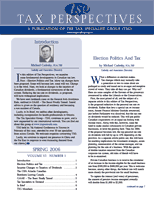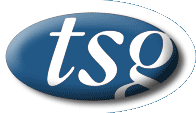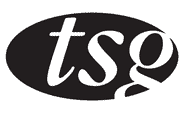
PDF Format
 Issue Contents Issue Contents
 All Issues All Issues
Spring 2006
Volume 6, Number 1
The information in Tax Perspectives is prepared for general interest only. Every effort has been made to ensure that the contents are accurate. However, professional advice should always be obtained before acting and TSG member firms cannot assume any liability for persons who act on the basis of information contained herein without professional advice.
In Brief
By Howard L. Wasserman, CA, CFP, TEP
Cadesky and Associates LLP (Toronto)
SR&ED And Stock Options Last year, in a surprise decision, the Tax Court determined that a corporation could claim investment tax credits for SR&ED on certain stock option benefits realized by employees. When an employee exercises a stock option, there is a taxable benefit equal to the difference between the fair market value of the stock at the time of exercise and the price paid under the option. The amount of the benefit is not deductible to the employer for two reasons; there is a specific prohibition against taking a deduction at the corporate level, and the employer does not have a cash outlay. Certain countries do allow an employer to take a deduction for stock options exercised by employees. The U.S., for example, allows a deduction provided the stock option is not an incentive stock option. A creative argument was developed that, while the employer could not take a deduction for stock options, the economic expense was nevertheless eligible for R&D tax credit claims. The Tax Court agreed. The Departure of Finance released draft legislation on November 17, 2005, to reverse this decision. This new legislation, if enacted, will be effective for options granted and shares issued on or after November 17, 2005. Non-Resident Trust/Foreign Investment Entity Legislation Legislation to amend the taxation of non-resident trusts and foreign investment entities (such as foreign mutual funds) has been pending since February, 1999. The latest version of draft legislation was issued in July, 2005 to apply retroactively from January 1, 2003. The legislation with respect to foreign investment entities is, in our view, unworkable. The rules are overly complex and complying with the rules will be extremely difficult, as will their enforcement. In the meantime, a more serious problem is developing. People are ignoring both the proposed rules and the existing rules. It is unrealistic to expect taxpayers to amend tax returns which have been previously filed. It is highly unlikely that this legislation will be passed into law before the due date for filing 2005 tax returns, meaning that this legislation will have been in limbo for three full years of personal tax filing. Changes In Macau In a previous issue of Tax Perspectives, we described the tax system in Macau, a former Portuguese colony near Hong Kong, and now a Special Administrative Region of China. We outlined how it was possible to establish a business in Macau, and obtain an exemption from income tax, provided certain conditions were met. In particular, the business had to obtain premises in Macau, and employ at least two local residents. The Macau offshore companies became popular, but unfortunately the Macau government has now limited the circumstances under which they can be established. Previously, there were 20 categories of activity which would qualify as eligible for Macau offshore company status. These 20 categories have been reduced to seven. As a result, the most popular activity, international trading, can no longer be operated through a Macau offshore company. There are grandfathering rules for companies in existence before the new rules were promulgated. Developments In The European Union In the last two years, countries in the European Union have been witness to tax changes at a rate and of a magnitude never before seen. In the EU, certain fundamental freedoms are guaranteed, such as the right to live and work in any EU country, the right to invest without prejudice, the right to establish businesses, etc. For these purposes, the European Union is treated as one country, in much the same way as Canada is a federal country made up of provinces. Discriminatory practices which violate these freedoms are now being struck down by the European Court of Justice. The income tax systems of most countries tend to discriminate in the international area. The tax rules usually favour residents or domestic companies to the detriment of foreign entities. In Canada, such discrimination would include confining certain tax credits and favourable tax rates to Canadian-controlled private companies. Thin capitalization rules, the FAPI rules (which impute investment income of foreign corporations to Canadian shareholders), the foreign investment entity rules, the rules on repatriation of dividends from non-treaty countries (taxable surplus), and transfer pricing regulations all discriminate since they do not apply to domestic situations. In the EU, these types of rules are consistently being struck down on the basis of discrimination. Countries are reacting in one of two ways; they either promulgate similar rules domestically (such as domestic thin capitalization rules), or they abandon their avoidance legislation. While these matters are confined at the moment to the European Union, there are significant implications for Canadian businesses. If the tax systems in the EU change significantly, it will not take long before there is a spill-over effect on the rest of the world. The OECD model tax treaty has been widely used all over the world. The changes in the EU may cause a fundamental rethinking of how international tax systems interact with one another, which was the key purpose of the OECD model tax treaty. It may need to be rethought. The next edition of Tax Perspectives will contain an in-depth article on Developments in the European Union. Non-Family Shareholders For Health Professional Corporations The Ontario government finally released regulations about which family members can own non-voting shares in dental and medical professional corporations. The regulations state that non-voting shares in a professional health corporation can be owned by any of the following: - A member of the medical or dental association, directly or indirectly;
- A family member of the medical or dental practitioner, directly or indirectly;
- A trust for the minor children of the medical or dental professional.
Family members are defined to include a parent, spouse or child. The regulations allow for income splitting with children who are over 18 years of age as well as a multiplication of the capital gains exemption for all family members. A holding company is not a possibility for any of the categories of shareholders. A trust can only be used for minor children. At this point, it is unclear what happens when a minor child who is a beneficiary of a trust turns 18. It appears that the trust would have to distribute that child's shares. We anticipate that the other professional bodies will be lobbying the government to allow family members as non-voting shareholders.
| 



